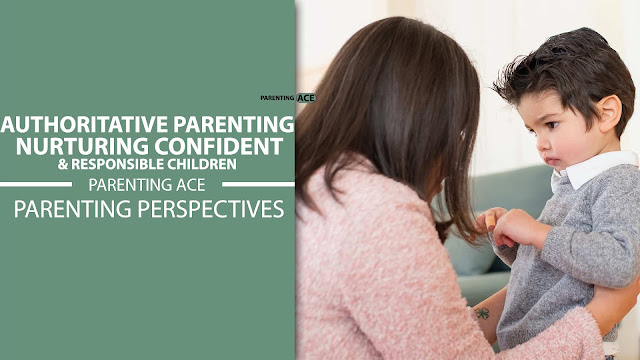Authoritative Parenting: A Blueprint for Nurturing Confident and Responsible Children
In today's blog post, we embark on a journey into the realm of Authoritative Parenting, a style renowned for its balance of warmth, guidance, and discipline. Delving into the intricacies of this approach, we uncover how Authoritative Parenting fosters healthy parent-child relationships, promotes self-esteem, and cultivates resilience in children. Join us as we explore real-life examples and delve deeper into the principles and benefits of this influential parenting style, guiding both parents and caregivers towards effective methods of nurturing their children's development.
 |
| Authoritative Parenting: A Blueprint for Nurturing Confident and Responsible Children |
Parenting is a journey filled with decisions, each influencing a child's development and shaping their future. Among the myriad of parenting styles, authoritative parenting stands out as a balanced approach that fosters independence, self-discipline, and emotional intelligence in children. Rooted in warmth, clear expectations, and consistent guidance, authoritative parenting serves as a blueprint for raising confident and responsible individuals.
Understanding Authoritative Parenting
Authoritative parenting is characterized by high levels of responsiveness and warmth coupled with reasonable levels of control and discipline. Unlike authoritarian parenting, which relies heavily on strict rules and demands obedience without room for negotiation, authoritative parents value open communication and mutual respect. They set clear boundaries and expectations while also encouraging independence and individuality in their children.
Key Principles of Authoritative Parenting
- Warmth and Support: Authoritative parents provide a nurturing and supportive environment where children feel loved, valued, and understood. They offer encouragement, praise, and affection, fostering a strong emotional bond with their children.
- Clear Expectations and Rules: While authoritative parents are responsive to their children's needs, they also establish clear expectations and rules. These rules are communicated effectively and enforced consistently, creating a structured yet supportive environment.
- Open Communication: Communication is a cornerstone of authoritative parenting. Parents listen attentively to their children, validate their feelings, and encourage them to express themselves openly. This open dialogue promotes trust, problem-solving skills, and emotional resilience in children.
- Reasoning and Explanation: Instead of resorting to punitive measures, authoritative parents engage in reasoning and explanation when disciplining their children. They help children understand the consequences of their actions, fostering empathy and accountability.
- Encouragement of Independence: Authoritative parents empower their children to make decisions and solve problems independently within a supportive framework. They provide guidance and scaffolding while allowing children the freedom to explore and learn from their experiences.
Examples of Authoritative Parenting in Practice
- Setting Limits with Empathy: When a child refuses to complete homework, an authoritative parent might empathize with their frustration while also emphasizing the importance of education. They would discuss the consequences of not completing homework and work collaboratively to find solutions.
- Encouraging Responsibility: Instead of micromanaging chores, authoritative parents empower children by assigning age-appropriate tasks and allowing them to take ownership of their responsibilities. They provide guidance and support but refrain from taking over tasks that children are capable of completing themselves.
- Supporting Emotional Development: When a child expresses fear or anxiety about a new experience, such as starting school, an authoritative parent would validate their feelings and offer reassurance. They might discuss coping strategies and encourage the child to communicate any concerns openly.
- Promoting Decision-Making Skills: Authoritative parents involve children in decision-making processes, such as choosing extracurricular activities or setting family rules. They provide guidance and help children weigh the pros and cons of different options, empowering them to make informed choices.
- Maintaining Consistency: Whether it's enforcing bedtime routines or addressing behavioral issues, authoritative parents maintain consistency in their approach. They follow through with consequences and rewards consistently, reinforcing the importance of accountability and self-regulation.
Benefits of Authoritative Parenting
Research consistently highlights the positive outcomes associated with authoritative parenting. Children raised in authoritative households tend to exhibit higher self-esteem, better social skills, and improved academic performance. They are also more likely to develop resilience, problem-solving abilities, and healthy relationships later in life.
Authoritative parenting offers a holistic approach that balances warmth and guidance, empowering children to thrive in all aspects of their lives. By fostering open communication, setting clear expectations, and encouraging independence, authoritative parents lay the foundation for confident, responsible, and emotionally intelligent individuals. As we navigate the complexities of parenthood, let us embrace the principles of authoritative parenting and nurture our children's growth with love, empathy, and understanding. #ParentingPointers #ParentingPerspectives




